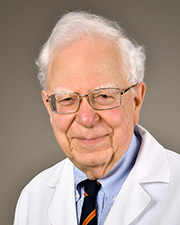Taegtmeyer wins mentoring award

A longtime cardiology faculty member is the recipient of the 2024 International Society for Heart Research North American Section’s Eric N. Olson Mentorship Award.
Heinrich Taegtmeyer, MD, DPhil, professor in the Department of Internal Medicine, Cardiology, is the fifth recipient of the annual award, which was established to “recognize a faculty member with a clear dedication to mentorship and their support of trainees and young scientists.” The award is named for Olson, a pioneer molecular cardiologist and chair of the Department of Molecular Medicine at UT Southwestern.
The award is selected by the Olson Mentorship Award Committee and was given to Taegtmeyer at the society’s North American Section meeting held in August in Long Beach, Calif.
“Your track record of training students and fellows is truly exemplary, and you are obviously highly deserving of this honor,” wrote the awards committee.
Taegtmeyer said he felt deeply moved to receive the award, which he called an actual “tribute to the teachers who taught me in my formative years.”
“It’s better to give than to receive,” Taegtmeyer said. “Funny enough, now I am receiving something for giving.”
His nominators noted his mentorship legacy, which includes “leading by example in a silent and humble manner, without expecting acknowledgment, or any praise, for his time and efforts.”
“As a successful physician-scientist, he is the perfect role model for both clinicians and bench researchers. Clinical translation of basic research has always been at the forefront of Heinrich’s philosophy, having regularly stated ‘without basic research there is nothing to translate,’” wrote his nominators.
Taegtmeyer’s research addresses the complexities of cardiac metabolism — the mechanisms by which the heart turns chemical energy into pump action. “The heart needs to eat to beat,” he said. Optimizing the fuel supply to the normal and stressed heart is the main goal of his research.
Over the decades, Taegtmeyer’s mentees have evolved into medical leaders throughout the world, including high-ranking positions at the University of Alabama-Birmingham, Harvard University, Johns Hopkins University, and Ohio State University. Of his 47 postgraduate mentees, the majority remained in medicine and research, including four directors/department chairs, four professors, 14 assistant/associate professors, 11 clinicians, 10 clinical fellows/ residents, and three scientists. In semi-retirement, Taegtmeyer said his mentoring is now limited to undergraduate and medical students –he has six under his wing now.
Taegtmeyer joined the Medical School faculty 42 years ago and is also on the MD Anderson UTHealth Graduate School faculty. During his career at McGovern, he has mentored 14 graduate students, served on thesis committees for 46 graduate students, and on examining committees for 25 PhD candidates. He has mentored 76 medical students, 27 postdoctoral fellows, mentored dozens of junior faculty, and hosted visiting scientists from across the world. In addition, he served as principal investigator of a T32 Institutional Training Grant, developing a training course to facilitate the career development of research trainees. Taegtmeyer’s laboratory has been funded by the NHLBI for 46 years, and he has sponsored three recipients of the competitive K99/R00 Fellowship-to-Faculty Award.
He graduated summa cum laude with his medical degree from Albert-Ludwigs-Universität Freiburg and he earned a DPhil (PhD) from the University of Oxford, England, where his supervisor was Professor Sir Hans A. Krebs, who received the Nobel Prize in Physiology or Medicine in 1953 for the discovery of the metabolic cycle named after him.
Established in 1968, the International Society for Heart Research aims to promote the discovery and dissemination of cardiovascular sciences knowledge on a worldwide basis. The society has eight international sections.